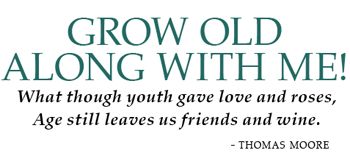Grow Old Along With Me!
It gets tiresome fighting the same battles all over again. To no one’s great surprise an outfit in the UK – calling itself the Institute of Alcohol Studies – is focusing its concern, and urging the rest of us to join in, on a problem that I, here in the US, and colleagues in the UK and elsewhere in Europe, are unaware exists: a virtual epidemic of alcohol abuse by the elderly. Picture the scene!
A natural, well-intentioned protective inclination to coddle the elderly, some might say to patronize them, has led, over the years, a number of dot-orgs to grudgingly allow no more than a single daily drink, better even less, to those of us past middle age. I suspect that some use concern for the elderly as a pretext to further their prohibitionary agendas. This blanket and arbitrary restriction is unscientific and unfair.
Like bottles of wine, even those in the same case, people age differently, one from the other. Although time may amplify what were once insignificant defects, a large and increasing proportion of the populace well beyond the age of 6O is very fit, mentally keen, healthy, and active. They don’t care to be told to desiccate their lifestyle. A mature person who drinks moderately is likely to both tolerate the alcohol better and benefit from it more than a young adult naïve to drinking. The older person is far more likely to handle alcohol responsibly. One is well advised to be especially cautious with frail individuals, of whatever age. Those few harboring specific contraindications to drinking, perhaps more likely among the aged, should be counseled by their individual physicians. (I hope the medical profession is becoming more sophisticated and objective about the nuances of alcohol consumption.) I should state that one needn’t start drinking just because of reaching a certain age. Let’s review some highlights from the medical literature.
Epidemiologic data, repeatedly confirmed, demonstrate the safety and health benefits of moderate drinking, especially for older people. Preservation of mental function (cognition), physical fitness, alertness, well-being, and social interaction all have been shown associated with moderate drinking, compared to abstention. The risks of the major causes of disability and death are gratifyingly reduced in moderate drinkers of age. We have seen evidence, hints and hopes that the combined effects of alcohol and the polyphenols found chiefly in red wine extend life span and delay the tolls of aging: atherosclerosis, cancer, inflammation, and dementia. Abstention and smoking are associated with intellectual decline. (Of course, it is possible that some of the more functional individuals are better able to gain access to potables.) In one intriguing study, the intellectual scores of aging co-twins who drink moderately are distinctly higher than those of their counterparts who drink substantially more or less. (The J-shaped curve again.) The mountainously well-documented reductions of risks of heart attack, stroke, other cardiovascular disasters, and diabetes are particularly important for older people. Another research group concluded, “Wine consumption remains one of the last pleasures of this stage of life: our findings argue against prohibiting mild or moderate wine consumption in the elderly.”
More recently, in a study by Lang, et al., of 13,333 men and women aged 65 and older followed in the US and England over five years, those who drink more than one or two per day scored better than abstainers by most health measurements. Further, these moderate drinkers do not show physiological signs of the increased sensitivity to alcohol in older people that some had feared, including declining body water content, higher blood alcohol concentration after a standard dose and decrease in the body’s ability to adapt to the presence of alcohol. The results indicate that, other factors being equal, older folks may drink as much as they did when younger, always within sensible limits and situations.
Skovenborg has pointed out that the decrease of total body water with age, a foundation of advised drinking restrictions, has been much exaggerated. (Less water would mean less space in the body in which to dilute alcohol.) He also noted that age differences in blood alcohol are minimized by drinking with meals and that net health benefits of higher consumption rise with age.

